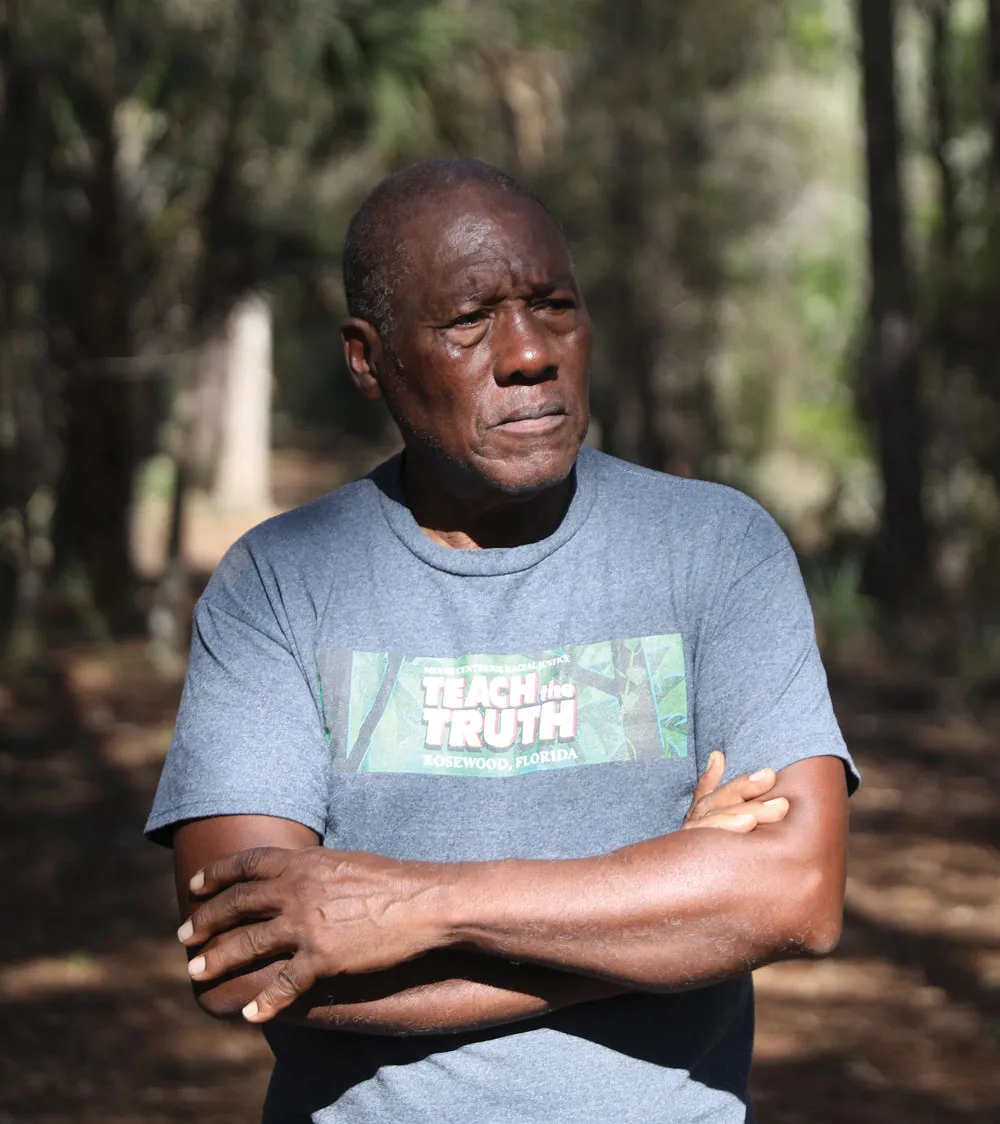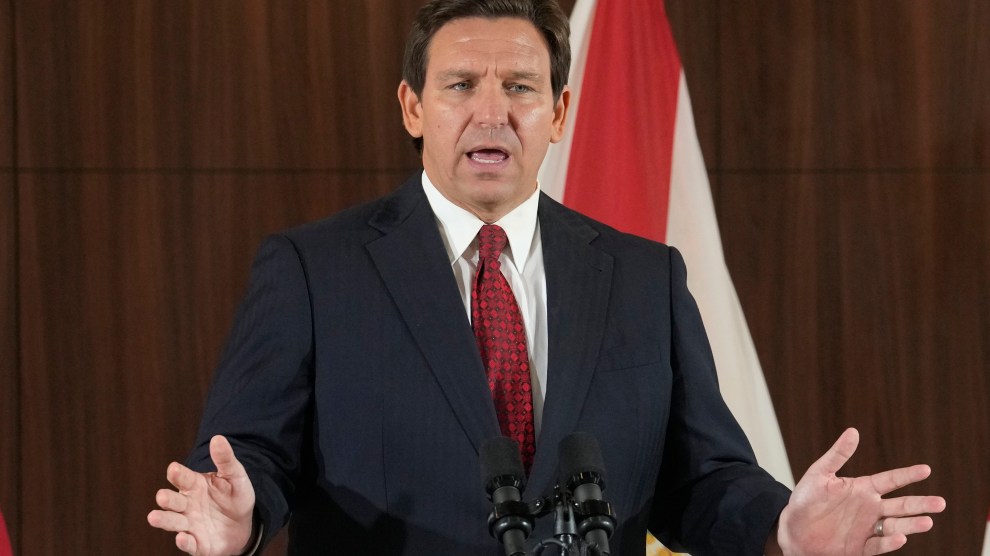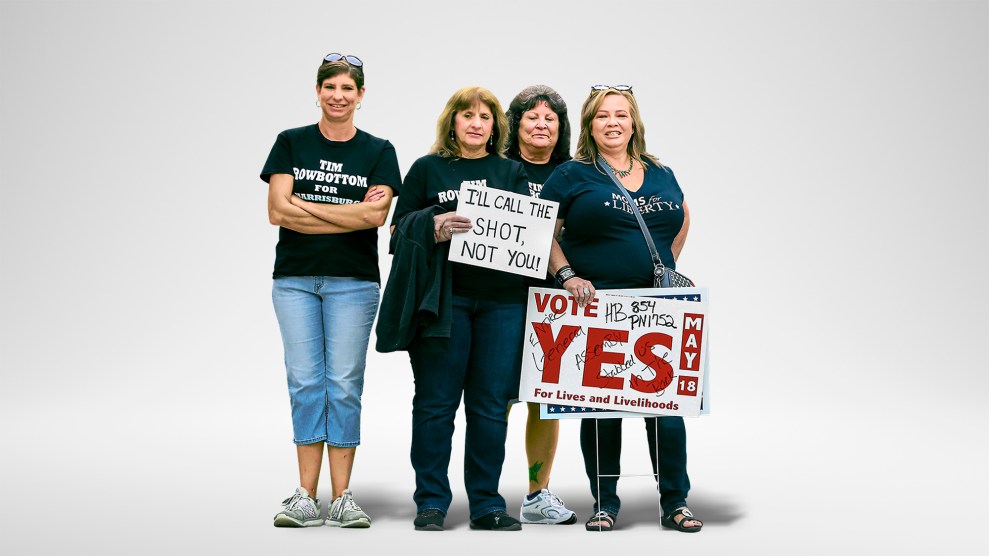On the morning of January 23, Jean Faulk opened her inbox to find an email labeled “urgent” from her principal at Bayshore High School in Bradenton, Florida. “Based on clarifications from the state in December, teacher-created classroom libraries fall under what the state is defining as library material,” Wendell Butler Jr. wrote to his staff of 75 or so teachers. Faulk and her colleagues suddenly were expected to cross-check their books against an online catalog of district-approved titles. If a book wasn’t in the system, it would have to be inspected by a librarian. The email instructed Bayshore’s faculty to “remove or cover” classroom libraries until the materials had been reviewed.
For more articles read aloud: download the Audm iPhone app.
As Faulk, a 65-year-old world history teacher and former journalist who oversees the school’s student newspaper, read the guidance, her anger, and incredulity grew. She had carefully curated her classroom library over the years, and the task of combing through several hundred volumes seemed insurmountable. So later that day she stripped her shelves of books like Amistad, The Hunger Games, and Anne Frank: The Diary of a Young Girl. Only dictionaries and encyclopedias remained. When she read the email, Florida was celebrating its annual Literacy Week.
As the directive trickled down from the school district to principals to teachers like Faulk, it didn’t take long for chaos to set in throughout the schools of Manatee County, located an hour south of Tampa on Florida’s Gulf Coast. Photos started to surface on social media of teachers’ classroom libraries with notes from students saying, “Free the books” and “Knowledge is power.” A veteran teacher described the process as a “travesty to education, the future of our children, and our nation.”
Similar accounts surfaced across the state. Andrew Spar, president of the Florida Education Association, the state’s largest teachers union, estimated teachers in about one-third of Florida’s counties were advised to purge their classroom libraries. In Jacksonville, a third-grade teacher penned an op-ed describing how one of her students, an avid reader, had cried after learning he couldn’t access the classroom library. Brian Covey, a full-time substitute teacher and father of two children in that same district, filmed the bare bookshelves at the middle school where he taught. After the video went viral and Gov. Ron DeSantis publicly called it “a fake narrative,” Covey was fired; Duval County officials said Covey’s “misrepresentation of the books available to students and the disruption” it caused violated social media and cellphone policies. The claim that books were being banned and classroom libraries shut down, DeSantis later said, was “a hoax in service of trying to pollute and sexualize our children.”
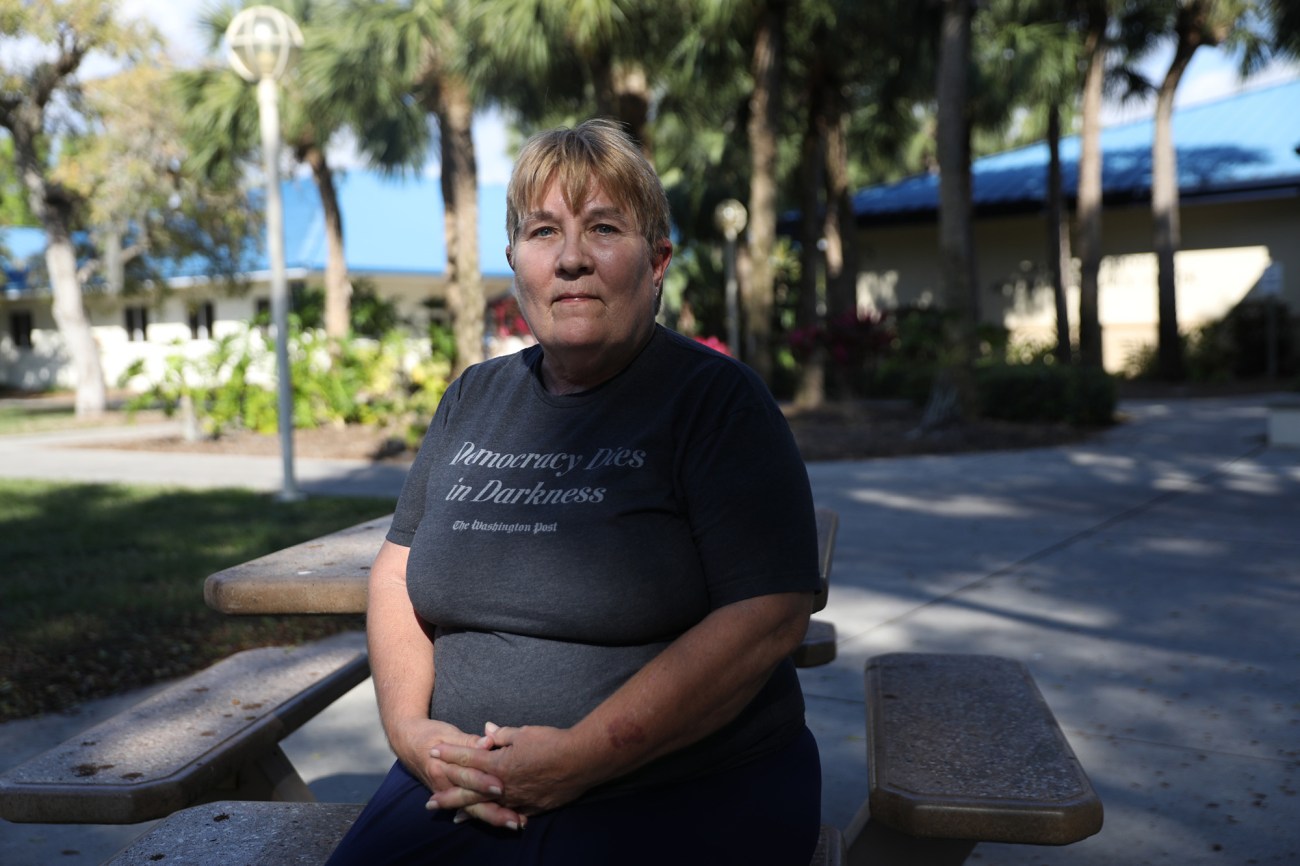
Jean Faulk has been a teacher for 10 years. But Gov. DeSantis’ attacks on school libraries have her thinking of retiring.
Octavio Jones
Many teachers would beg to differ. Over the past three years, Florida educators have been caught in the crossfire of the culture wars that DeSantis is waging to burnish his conservative bona fides in advance of the 2024 presidential election. The classroom library policies adopted by Duval and Manatee counties felt like “a new level,” says Faulk, set in motion by a recent “curriculum transparency” law, HB 1467, which provides for the “regular removal” of books not aligned with state standards. According to the statute, signed into law in March 2022, all books in public school libraries or assigned reading lists should be “free of pornography” and approved by certified librarians who attended an annual mandatory Florida Department of Education (FLDOE) online training. It encourages librarians to “err on the side of caution”—and no wonder. Books found to be in violation of a separate preexisting law prohibiting the distribution of pornographic materials to minors could trigger a third-degree felony charge carrying up to five years in prison and a $5,000 fine. Teachers theoretically could also lose their certification should they violate the new law.
From the moment its provisions went into effect last summer, HB 1467 proved chilling. But six months later, when the FLDOE ruled that the legislation also applied to classroom libraries, it really threw teachers for a loop. Some concluded the risk was far too great. That’s why Faulk got rid of her books, including one written by John Adams about the 1787 Constitutional Convention that didn’t appear in the database.
Faulk was not alone. In March, the teachers union sued the FLDOE, claiming it had illegally extended the law’s scope to classroom libraries, “substantially harm[ing] hundreds of thousands of teachers, libraries, students, and families by upending Florida’s public education system.”
Immediately after she read the email, Faulk wrote back to Butler, noting she didn’t plan on re-creating “what was a very diverse and comprehensive library, one that I have been building since I began teaching,” she wrote. “Given my journalistic background, to say I am highly upset by this does not even begin to cover my feelings…I also understand it is not you or the school, but the district and the state.”
After 10 years as a teacher, three at Bayshore, Faulk is thinking of retiring at the end of next year, in no small part due to the added burden of DeSantis’ encroaching education policies. “I don’t know how much more I can fight,” she tells me. Her classroom used to feel like an inviting living room for her students, with plants, a collection of knitted owls, a small women’s suffrage statue, an old dial-up phone. But now, Faulk says, “I don’t have any books left.”
Since y'all wanna play the "this isn't really happening" game https://t.co/bVUFOXPc6a pic.twitter.com/fUUkJgi5ls
— JagsFanBrian✊🏿✊🏽✊ (@JagsFanBrian) January 27, 2023

Classroom libraries are the most recent casualties in DeSantis’ crusade to protect “parental rights” by attacking the “woke indoctrination” of students by schools. In March 2022, he signed the so-called “Don’t Say Gay” legislation, which barred classroom instruction on gender identity and sexual orientation through third grade and also enabled parents to sue school districts if they violated its provisions. A month later, the governor banned any teaching of critical race theory (CRT) with the Stop WOKE (Wrongs to Our Kids and Employees) Act, even though the decades-old academic framework to examine how racism is embedded in society—precisely his administration’s definition of “woke”—isn’t explicitly taught in K–12 schools. Recently introduced legislation would further advance the governor’s agenda: Proposals include expanding the “Don’t Say Gay” prohibitions through eighth grade and to charter schools; barring school employees from calling students preferred pronouns that don’t correspond to the sex they were assigned at birth; and restricting instruction on reproductive health. Legislators also pushed a universal voucher bill offering parents more options for funding private education, which the governor signed this month.
DeSantis has tightened his grip on public education in other ways. Last year, his political committee spent $2 million to pack local school boards with ultraconservative members backed by so-called parents’ rights groups like Moms for Liberty. He has a list of 14 current school board members he plans to challenge in upcoming elections for failing to uphold parental rights. “Frankly, it’s nothing more than bullying,” Tom Edwards, a Sarasota County school board member on the list, tells me. “That is not the way I think we want our children to understand how democracy works.”
In January, the governor blocked an Advanced Placement course in African American studies for high school students by claiming it promoted a “political agenda” and lacked “educational value.” Among the topics the FLDOE flagged were intersectionality, Black queer studies, movements for Black lives, and reparations for slavery, as well as the Black feminist academics Angela Davis, bell hooks, and Kimberlé Crenshaw. More than 800 college professors signed a letter denouncing the DeSantis administration’s efforts to “intimidate” the College Board—the nonprofit that runs the SAT and standardizes curriculum and exams for AP courses—“into appeasement and wholesale revisions,” calling it “censorship.”
In early February, the College Board issued a final version of the African American studies curriculum. Themes the governor had objected to were omitted or weakened. The FLDOE thanked the testing organization for eliminating 19 topics deemed “conflicting with Florida law.” After an explosion of national outrage, the College Board fired back. In a statement, the College Board said, “The dialogue surrounding AP African American Studies has moved from healthy debate to misinformation”; instead of providing constructive feedback, the FLDOE had asked questions like, “Does the course promote Black Panther thinking?” The College Board also denied removing content at the behest of Florida officials even though, as it wrote, “Florida is attempting to claim a political victory.” The organization stood by its changes but admitted to having waited too long to call out the state’s “slander” regarding the curriculum. Meanwhile, following Florida’s example, other states have decided to scrutinize the AP African American Studies course.
DeSantis’ efforts don’t stop at K–12 schools. He has laid out a plan to overhaul higher education, purging “ideological conformity,” tenure, CRT, and diversity and equity. And his appointment of a slew of conservative allies to the board of trustees of New College—a small liberal arts school that the administration explicitly hopes to reshape in the image of a private Christian college in Michigan—has been characterized as a “hostile takeover.”
The governor touts these education changes and his defiance of Covid public health mandates as proof of how, under his leadership, the state has become the linchpin of freedom. “When common sense suddenly became an uncommon virtue,” he said in the inaugural speech for his second term, “Florida was a refuge of sanity.” But as he continues to consolidate power and enhance his national profile, DeSantis has created an environment where educators feel “we have a target on our backs,” says Spar, the union president. The “vilification of teachers,” he says, is driving many to reach a breaking point.
That climate “has contributed to life-long, dedicated educators deciding it’s not worth it to stay in their chosen profession,” says Pat Barber, president of the Manatee County teachers union. “A day doesn’t go by that somebody doesn’t call me to ask me about their options.” In fiscal 2022–2023, the county had about 50 open teaching positions to fill; it now has more than 80, according to Barber. (Manatee is a majority white and conservative-leaning county that DeSantis carried with 64 percent of the vote in 2022.)
As of late 2022, the Florida Education Association reported a statewide shortage of 10,000 teachers and support staff. “People are leaving faster than we can hire,” Spar says, adding that more than 100,000 students in the state lack a full-time accredited teacher. With an average salary of $51,000, Florida ranks 48th in the nation in teacher pay. Every day on social media Spar sees another teacher announce they are quitting the state or the vocation altogether. On their way out the door, some tell Spar they can’t stay in a profession where they know harm is being done to kids.
Don Falls, a social studies teacher at Manatee High School, echoes Spar’s comments on the low pay, lack of job protection, and unsatisfactory benefits. Morale has never been lower, he says, “and then you have the governor hanging over you with the threat that if you say the wrong thing to some kid, or the wrong book ends up in somebody’s hands, not only could your career be in jeopardy, but the book law carries a third-degree felony violation.”
Born outside of Detroit and raised in Florida, Falls has been in classrooms for 38 years, the last 12 at his alma mater, which his wife and children also attended. For more than a decade, he’s taught about the civil rights movement and systemic violence against Black people. But this year, when he was organizing a lesson, Falls wondered if some crucial element in his curriculum might run afoul of the law. “My white students sitting here watching water hoses and dogs being turned on Black protesters in the streets of Birmingham, does that make them feel bad about being white?” he asks. “I would have never thought about that prior to this world we live in right now, where clearly the attempt is to try to sanitize history and culture.”
Falls’ contract means he enjoys more security than most of his colleagues, especially the younger ones, who have no idea whether they will be rehired at the end of each school year. Upon learning about the classroom library policy in January, he decided to cover his books and posted a sign that read: “Closed by order of the governor.” The future of his profession in Florida, Falls says, looks bleak. “If I were a young person again…I wouldn’t do it,” he says. “If you want to be a teacher, go someplace where better minds have prevailed. It’s not Florida.”
On the same day Faulk saw the email from her principal, DeSantis announced his “Teachers’ Bill of Rights.” If approved by the Republican-controlled legislature, the proposal would invest $200 million in raising teachers’ pay. Unions, however, would be undermined: The automatic deduction of their dues from paychecks would be prohibited, and recognition would only come for unions representing at least 60 percent of eligible employees. Terms for school board members would be reduced from 12 to 8 years, and school board elections would become partisan—meaning the candidates’ party affiliation would appear on the ballot. “This goes far deeper than just culture wars,” Democratic state Rep. Anna V. Eskamani said of the proposal on Twitter. “This is an educational power grab.”

Some educators are determined to fight back. Marvin Dunn, a professor emeritus at Florida International University, founder of the Miami Center for Racial Justice, and the author of several books, including A History of Florida: Through Black Eyes, has publicly opposed the new policies. At 82, Dunn has lived the experience that DeSantis seems intent on erasing from the curriculum. He grew up near Daytona Beach during the Jim Crow era, attended segregated schools, and drank from separate water fountains. Dunn has repeatedly challenged the governor—who said Florida would never surrender to the “woke mob”—to confront actual historical events of white supremacists targeting Black people. “‘WOKE mob’ Mr. DeSantis?” he tweeted in February. “What about this REAL mob that hung Rubin Stacey in Fort Lauderdale in 1935? We don’t have to make up mobs, governor. You do.”
"WOKE mob" Mr. DeSantis? What about this REAL mob that hung Rubin Stacey in Fort Lauderdale in 1935? We don't have to make up mobs, governor. You do. pic.twitter.com/4Jfv71YQkt
— Dr. Marvin Dunn (@MarvinDunn4) February 5, 2023
“Florida’s history has always downplayed, dismissed, or marginalized Black heroes who stood up to resist racism,” Dunn says. Its contemporary expression, he adds, is the DeSantis administration’s erasure of Black thinkers and its “cherry-picking” of history. In response, Dunn established Teach the Truth Tours earlier this year, taking high school students and their families to sites of anti-Black violence. He has led groups with dozens of people to Newberry, where six Black people were lynched in 1916, and to the memorial site for civil rights and education activists Harry T. and Harriette V. Moore, teachers who advocated for pay equity for Black educators and were at home on Christmas in 1951 when a bomb planted by the Ku Klux Klan exploded and killed them. Dunn has seen visitors cry around the gravestones and students express frustration that they knew nothing about this.
“If you take people to the bloodied ground where these things happened,” Dunn says, “and you have them walk the ground and connect with ancestors who suffered in this place, it makes for an unforgettable experience. When you do that with a high school student and his mom or dad, or with his grandma or grandpa, that story then becomes a part of the family’s story and it gets passed down around the Thanksgiving table and around the Christmas tree.”
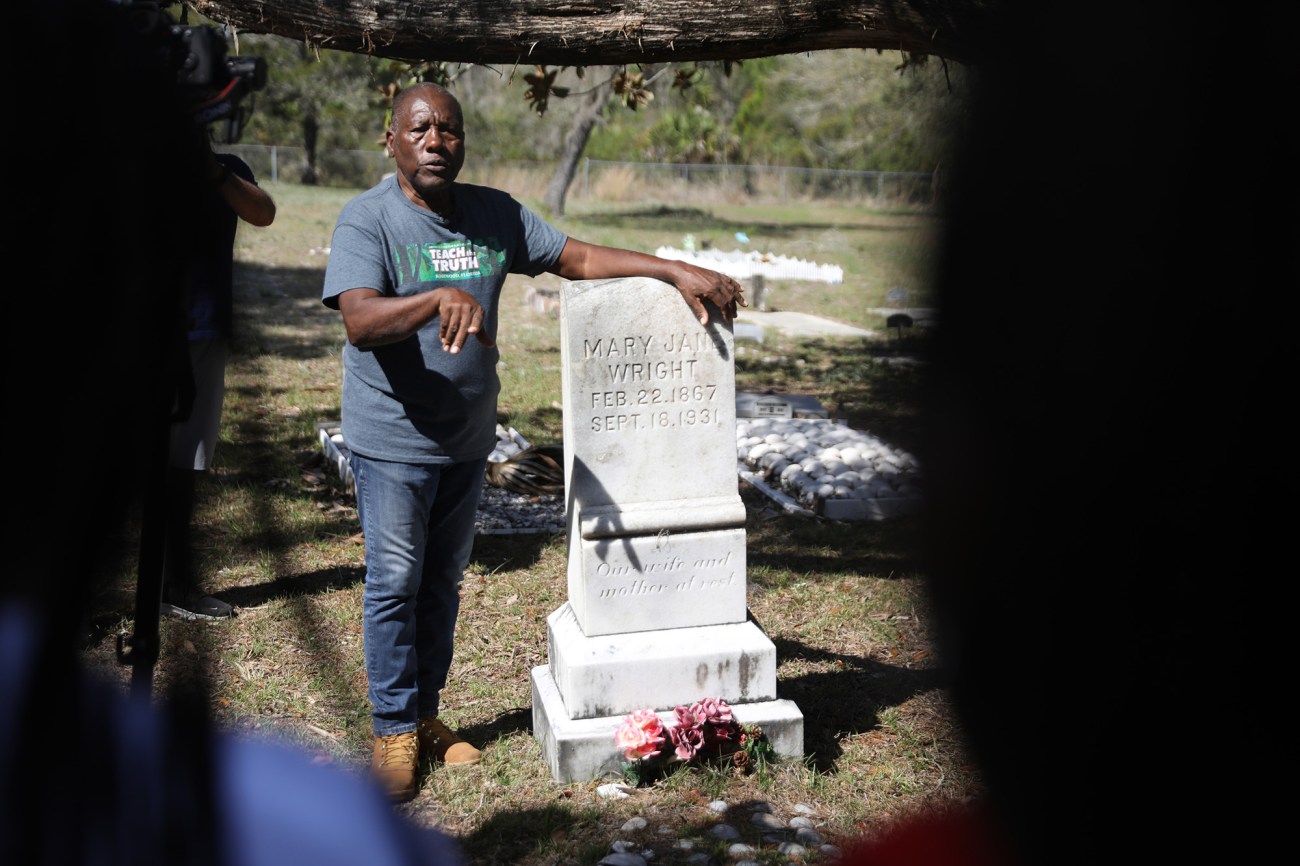
Marvin Dunn leads a Teach the Truth Tour at a cemetery in Rosewood.
Octavio Jones
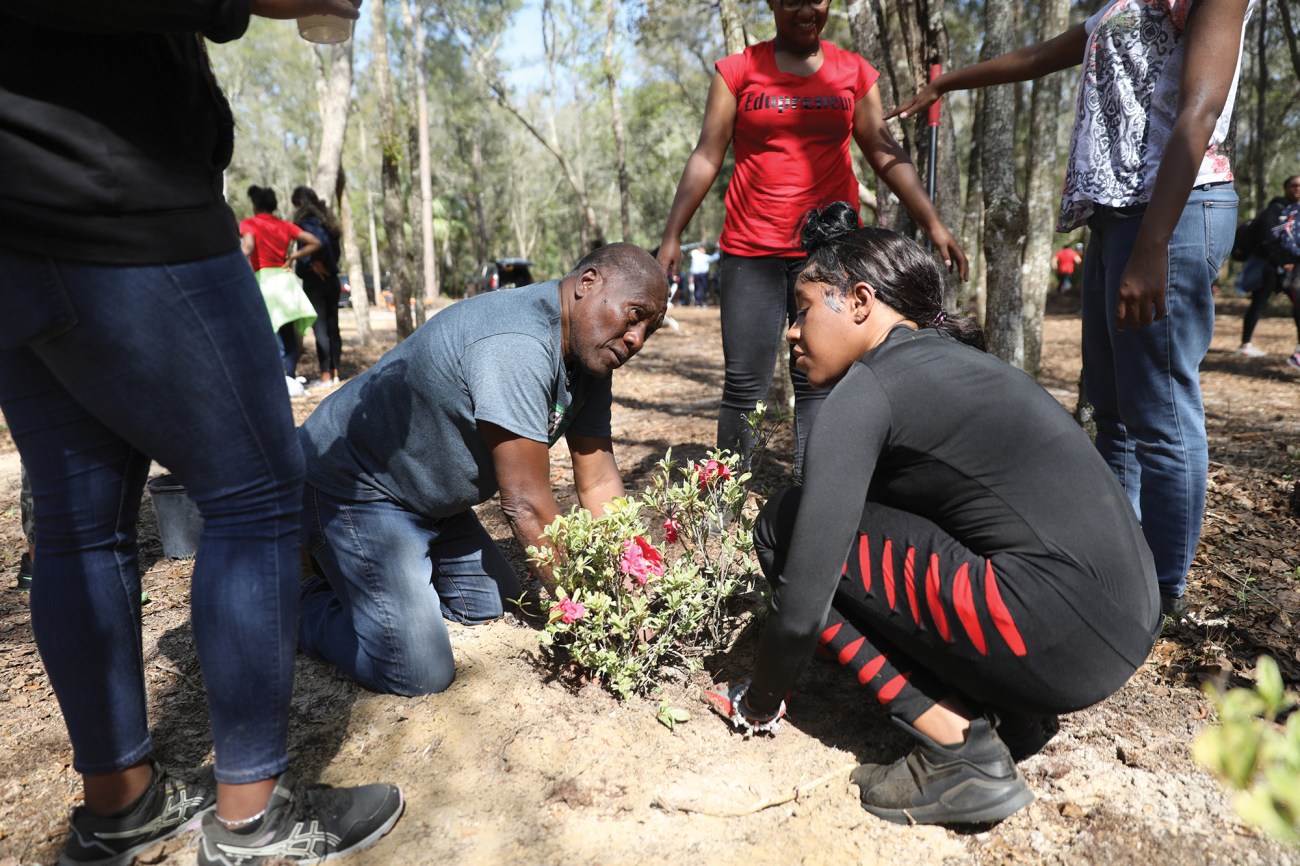
Dunn plants flowers with students near the site of the Rosewood Massacre.
Octavio Jones
In January, he held a wreath-laying ceremony for the centennial of the 1923 Rosewood Massacre, when over several days a white mob burned a predominantly Black town to the ground, killing at least six Black residents. Some townspeople fled the violence and passed through a 5-acre property that Dunn now owns, and where he holds educational sessions. Hundreds attended, including students and descendants of the few families known to have survived the rampage. “This many Black folks have not been in Rosewood since the massacre,” Dunn told them.
A central dynamic underlying all of DeSantis’ proposals, Dunn observes, is the attempt to remove emotion—of teachers and students—from the classroom, thereby rendering “education meaningless.” “I don’t know how to teach about slavery and not have feelings come into it,” he says. “I don’t know how to teach about an enslaved woman having a child snatched from her breast and sold into slavery and not say that that’s bad.” He worries that in a few years, Florida students might not know who George Floyd was, just as most students today haven’t heard of Arthur McDuffie, whose death at the hands of white police officers spurred the 1980 Miami riots.
Dunn joined other professors and a student as plaintiffs in a lawsuit the American Civil Liberties Union filed last August challenging the Stop WOKE Act. The complaint claims the legislation amounts to “racially motivated censorship” that discriminates against Black instructors and students and violates their First and 14th amendment rights. In November, a federal judge blocked the law from being implemented in higher education. “‘It was a bright cold day in April, and the clocks were striking thirteen,’ and the powers in charge of Florida’s public university system have declared the State has unfettered authority to muzzle its professors in the name of ‘freedom,’” Chief US District Judge Mark Walker wrote, quoting George Orwell’s 1984 in his decision. “This is positively dystopian.”
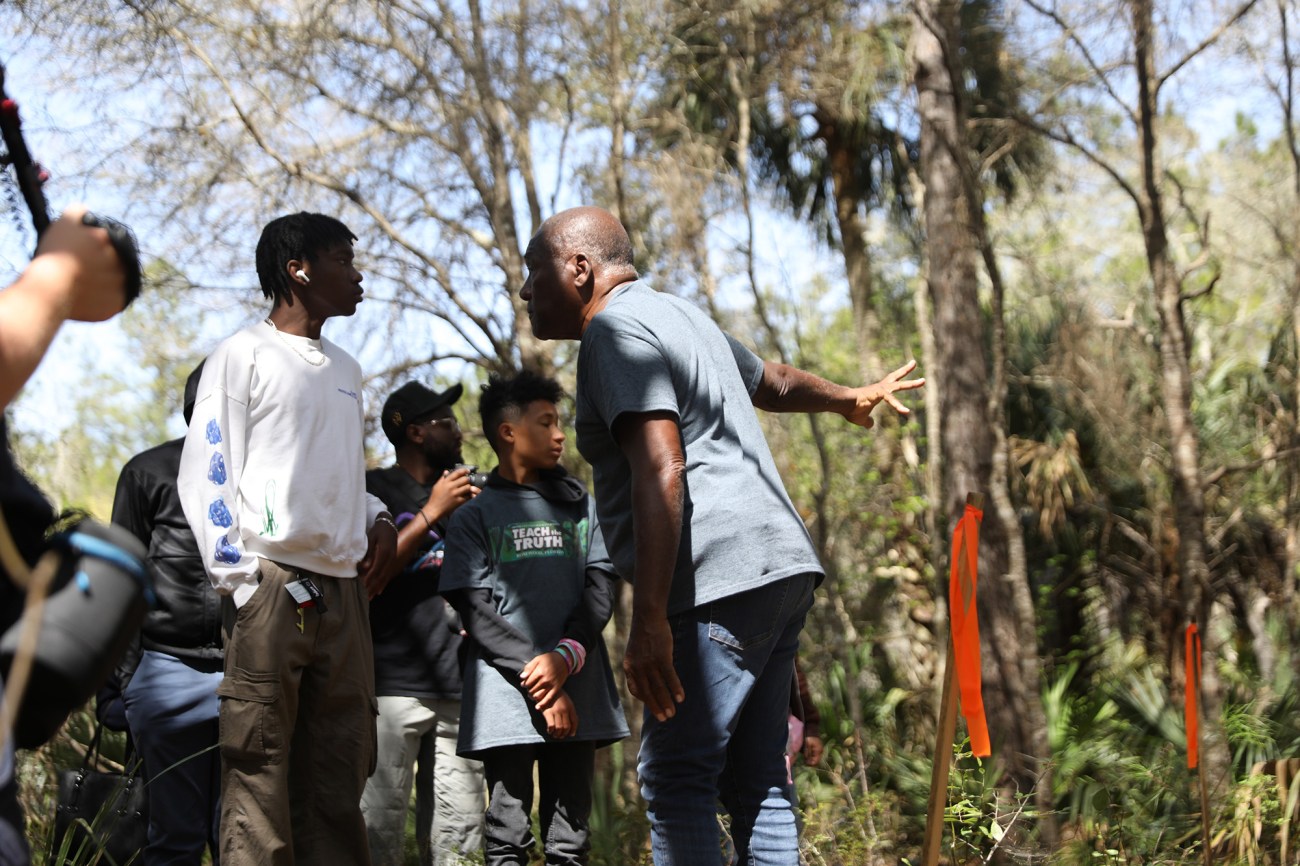
Dunn speaks to students on a Teach the Truth Tour at Rosewood.
Octavio Jones
At a February community meeting in Miami, Dunn denounced DeSantis for tapping into racial resentment and fear to advance his political ambitions. It struck him that most people who showed up to protest alongside him were white, as are many of the teachers and parents leading efforts to push back. “White teachers have less reason to be afraid,” he says. “White people can stand up and resist in ways that Black people can’t.” He is aware of the risks he’s taking. “Does it make me a vulnerable person because I’m speaking out? Probably. Do I care? No.”

A few days after teachers at Bayshore High School received the classroom library edict, Manatee County’s school board convened. Word spread quickly about the new policy and teachers’ concerns. Some community members were supportive of the change and praised the district for implementing it swiftly. “It was not about parents against the teachers,” said Deanna Brinkley, an outspoken activist linked to Manatee Patriots, a local conservative group. “It was doing what needed to be done, a little of the cleaning of the house.” The group has called on “Woke Busters” volunteers to be their “eyes and ears and boots on the ground in the schools.” Three of Manatee County’s five school board members were endorsed by DeSantis, and one of them, Chair Chad Choate, was appointed by him. Choate insisted that the policy was not about banning books. Instead, it was about “protecting the teachers,” who, he said, shouldn’t feel like “book police [are] coming to make sure everything is under control. Just don’t allow your books right now to go out until you feel like they are all vetted.” Cindy Spray, another board member handpicked by DeSantis, encouraged community members to volunteer with the district, saying, “We need to get these books out of these schools.”
Despite vocal concerns over inappropriate materials infiltrating the district’s schools, only three community members had challenged a total of 30 books as of late January, including The Hate U Give and Lily and Dunkin, the story of a transgender teenager and a boy with bipolar disorder. That number represents 0.01 percent of all available titles, and an even smaller fraction was removed or subjected to parental consent, according to the district’s executive director for curriculum. In an email, Kevin Chapman, the Manatee County school district’s chief of staff, said they are “abiding by all applicable laws and statutes of the state of Florida and adhering to the guidance of the Florida Department of Education.” The district is counting on 500 volunteers to help catalog the books.
Marie Masferrer, a board member of the Florida Association for Media in Education and a librarian in Hillsborough County who worked in Manatee County for 12 years, attended the meeting. She urged classroom libraries to remain open throughout the “heavy lift” of the vetting process. “Something you didn’t hear about when you were talking about books and instructional materials were our kids,” she told the board. The new policy had created “trauma in our children, who said, ‘Please don’t do this, please don’t take away our books.’”
In January, Masferrer took the mandatory FLDOE training for librarians, which outlines a number of ways to determine whether material is appropriate for a school library. Librarians should assess how comfortable they would feel reading passages of the book in public, for instance, and beware of unspecified “unsolicited theories” that could lead to student indoctrination. It also provides Merriam-Webster’s definition of “pornography” as descriptions of erotic behavior “intended to cause sexual excitement” and makes it clear that each school district is responsible for setting their own policies for challenged materials.
The training was devised by a working group that included librarians as well as two parent representatives affiliated with Moms for Liberty, the well-funded parents’ rights group that was DeSantis’ main ally in taking over school boards. Jennifer Pippin, who leads the Moms for Liberty chapter in Indian River County, was recommended by the managing director of Florida Citizens Alliance, a group close to DeSantis with a history of objecting to textbooks. In March 2022, she filed a criminal complaint claiming the school district had failed to remove most of the 150 books Moms for Liberty objected to for their alleged sexually explicit content. The sheriff’s office closed the case due to “lack of criminal activity.”
Pippin said the training was “95 percent where it needs to be.” It contained recommendations she had pushed for, such as the emphasis on the third-degree felony charge. “We wanted to make sure they absolutely were aware of what could happen to them if they broke the law,” she says. (Pippin unsuccessfully lobbied the state to remove sentences about protecting librarians. “We are here to PROTECT unaccompanied minor children in public school libraries,” she wrote in an email to state officials. “Period. Full stop.”)
Pippin was joined by Michelle Beavers, a mother of six and founding member of Brevard County’s Moms for Liberty chapter, who’d been nominated to help develop the training by one of the group’s co-founders. In an email to a senior chancellor at the FLDOE, Beavers trumpeted her efforts to challenge “sexually exciting” books. She has also successfully advocated streamlining the process to take titles like This Book Is Gay off the shelves. “Yes, we’ve gone after LGBTQ books, but not because they had gay characters or homosexual characters in them,” she told Mother Jones. “We went after them because there was sex in the books.” (Beavers recently left her local Moms for Liberty chapter over a disagreement with leadership.)
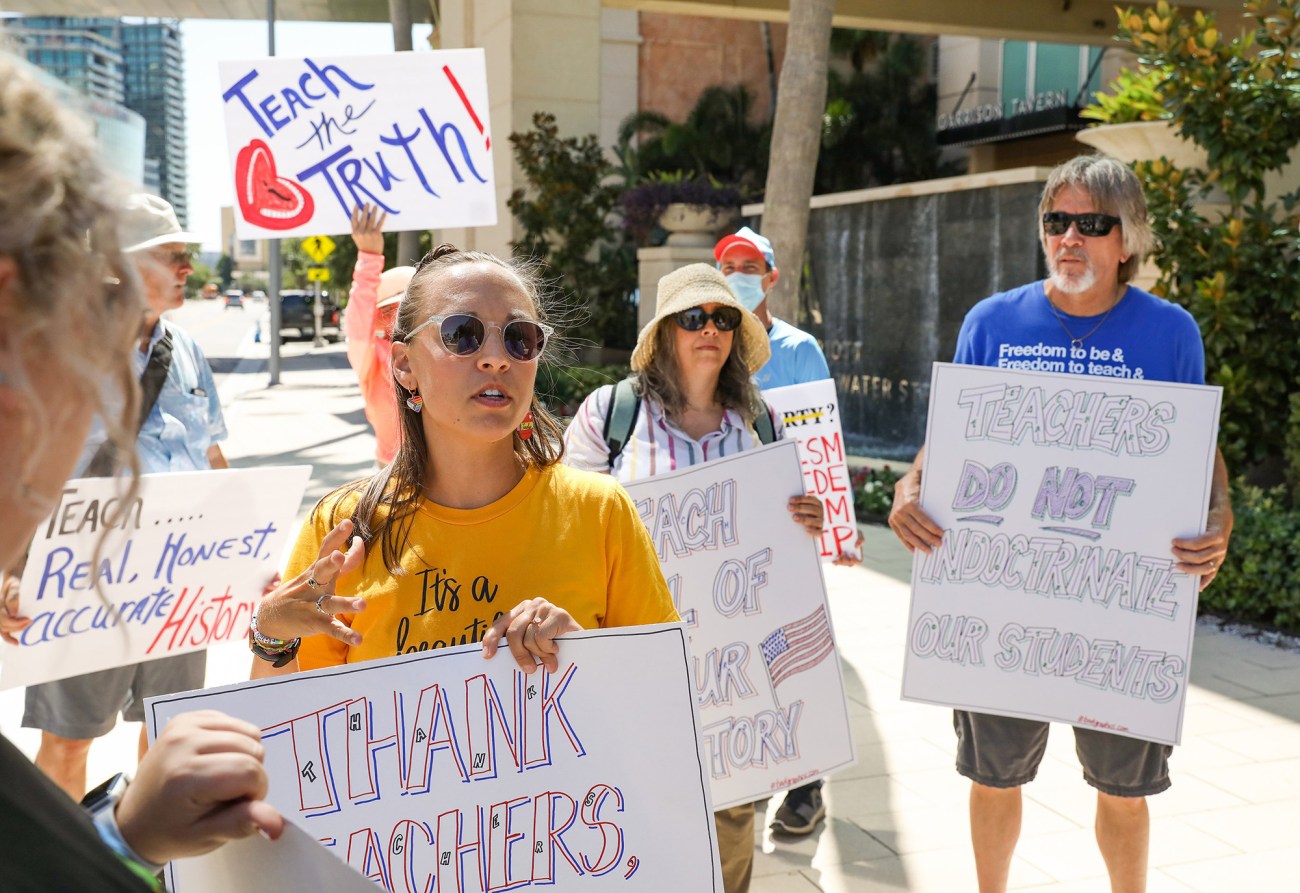
Alyssa Knight (left), Dunedin Highland Middle School teacher, speaks with attendees outside the Moms for Liberty National Summit in Tampa.
Lauren Witte/Tampa Bay Times/Zuma
In the end, despite the influence of Moms for Liberty, Masferrer says the training mostly covered commonsense best practices that professional librarians have used all along. Certified school librarians in Florida are overworked and difficult to find, so not every district has one. A job posting for an elementary school librarian in the Manatee County school district lists as many as 20 responsibilities; the annual salary is $48,586. Officials at Duval County Public Schools said they are considering rehiring retired librarians to expedite the process of reviewing the district’s 1.6 million books, a herculean and likely expensive endeavor. (As of March, the district had authorized about 10,000 books.) Indeed, one Sarasota school board member estimated the total cost of reviewing a single challenged book, including legal fees, amounted to $20,000.
Some school districts have enacted policies allowing parents to keep their children from accessing certain books, but very few parents have taken schools up on it. Still, it has led to self-censorship. Librarians in schools that faced objections to books were less likely to acquire new LGBTQ texts, a researcher at Boston University found.
“It’s kind of encouraging a statewide ban on books,” says Raegan Miller of the Florida Freedom to Read Project, which was started by two mothers in Orange County after the district pulled Maia Kobabe’s Gender Queerfrom school libraries. The group tracks the removal of books from shelves across the state and has documented more than 2,000 attempts so far. “My fear is that what is going to happen is it is going to get so tight that the state is going to say, ‘Here are the books allowed in your library, and that’s it.’”
Cassie Palelis, press secretary for the FLDOE, wrote in an email: “Florida does not ban books, and therefore, there is not a banned book list.” The department, she added, “expects that there are no bare bookshelves in any media center or classroom.”
In Pinellas County, where Miller resides, one parent successfully got Toni Morrison’s The Bluest Eye—the story of a Black girl growing up in Ohio who yearns for the treatment that whiteness would offer—pulled from media centers. One high school English teacher in Escambia County admitted to the newsletter Popular Information, which first reported on the Manatee County classroom library fallout, that she was a member of the Daughters of the Confederacy and has challenged 150 titles—including When Wilma Rudolph Played Basketball, about the Black sprinter’s childhood in the South—for being “very anti-white.”
In Duval County, a biography of Puerto Rican baseball legend Roberto Clemente and 178 other titles meant to “increase diversity of writers, characters, topics, and viewpoints” were held for review before hitting the shelves. The author of one of the books noted that many of the targeted materials appeared to be about nonwhite people. In Clay County, about 100 books were withheld from a list of 3,600 that conservative activist Bruce Friedman deemed objectionable. His reasons included the presence of CRT, “Black victimhood,” “anti-police sentiment,” and “white privilege.” In a form challenging an illustrated children’s picture book about Harriet Tubman, Friedman called it “revisionist history.”
Martin County in southeast Florida removed 84 titles, including 20 by bestselling author Jodi Picoult that were challenged over “adult romance” content, Picoult explained in an op-ed, adding most didn’t feature as much as a kiss. “What they do have, however, are issues like racism, abortion rights, gun control, gay rights, and other topics that encourage kids to think for themselves,” she wrote.
“It really isn’t about the book,” Masferrer says. “It truly is a culture war against anyone of any different background.” This year, Masferrer bought five LGBTQ books for her students, including I Am Jazz and Calvin, about transgender children. “Every time I think of a book that was challenged, I think of the child I bought it for. There are specific books that I purchased specifically for children who I know need them.”
“Books bridge divides between people. Book bans create them.”@jodipicoult explains how 20 of her books were recently banned in Martin County, Florida, the one ban that surprised her the most—and what you can do to take action.#jodipicoult #bannedbooks #florida #freethebooks pic.twitter.com/QV9Abk9m5d
— PEN America (@PENamerica) March 17, 2023

In 2006, after 35 years in the newspaper business, Faulk was laid off and began working at a domestic violence shelter, where she read bedtime stories for the children and helped them with their homework. One day, a colleague suggested she should consider being a teacher. She got her certification and eventually arrived at Bayshore High, with a large population of low-income and Hispanic students. Many parents, Faulk says, are immigrants who don’t speak English, and some of her students are the first in their families to attend high school. Several struggle with reading. A 2022–2023 schoolwide improvement plan report identified more than 560 students with a substantial reading deficiency.
“If the kids wanted a certain book to read and I didn’t have it in my library,” she says, “I would buy it for them.” Before the ban, she successfully raised funds to purchase dozens of copies of Every Falling Star: The True Story of How I Survived and Escaped North Korea; The Other Wes Moore: One Name, Two Fates; and a young readers’ edition of Malala Yousafzai’s memoir. One student once told Faulk she “was the first teacher who ever made her feel like she could become a great reader.”
At Bayshore, Faulk also returned to her journalism roots and revived the Paw Print student newspaper; last year, it won an award from Quill & Scroll, a group that honors and supports high school journalism. Meah Hird, the Paw Print’s 17-year-old editor-in-chief, wrote an opinion piece last year that questioned banning books. In it she reflected on the experiences of people of color and LGBTQ people. “A lot of what goes on in society is horrible,” wrote Hird, who identifies as mixed-race. “Some parents may be afraid of their children learning this. What better place to learn about it than school? Should the first time a child learns of what goes on in society also be the first time they set foot into the real world?”
Hird plans to study journalism at the University of Florida or maybe at an HBCU. She worries about her younger sister, who will be starting high school next year, and thinks it’s “ludicrous” that students haven’t been included in conversations about what they are allowed to read. “They’re taking away things that we ourselves haven’t even had a chance to look at or see what’s so wrong about it,” she says. After she cleared out her classroom library, Faulk gave Hird one of her now-bare bookcases and a few books, including Ray Bradbury’s dystopian classic, Fahrenheit 451, a story that shows “what can happen when you take people’s access to knowledge away,” Hird says.
DeSantis “would like nothing more than to do away with public schools,” Faulk says. The past few years have been demoralizing, and she has thought about leaving Florida, despite it being home to her family for generations. But then she reconsiders: “I may stay for my students and keep fighting against this.”

